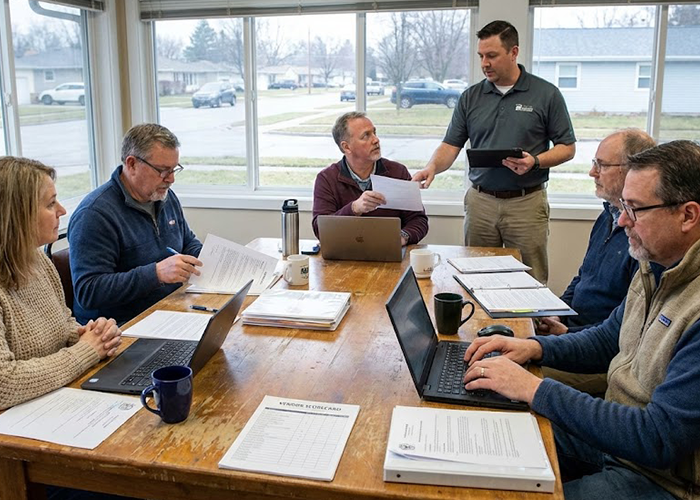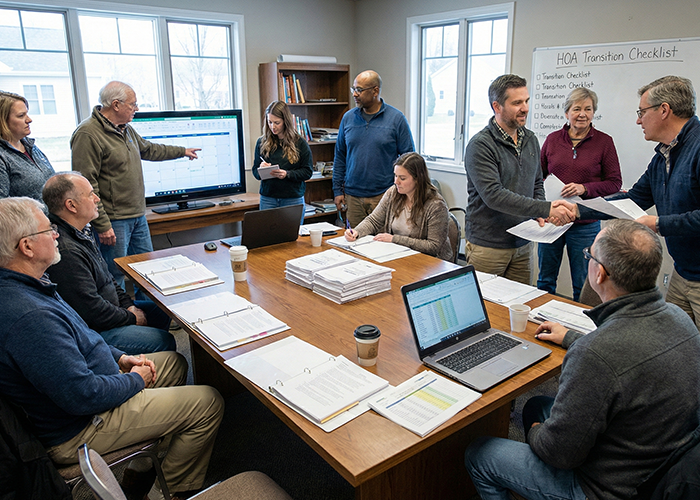HOA Reserve Study 101: Does Your Community Need It?

An HOA reserve study is an essential tool in examining and maintaining the financial health of your association. Yet, many boards remain in the dark about the importance of these studies and choose to forgo them altogether. But, what is a reserve fund study exactly and how will it help your community?
Browse By Category
Sign up for Our Newsletter
An HOA reserve study is an essential tool in examining and maintaining the financial health of your association. Yet, many boards remain in the dark about the importance of these studies and choose to forgo them altogether. But, what is a reserve fund study exactly and how will it help your community?
The Definition of an HOA Reserve Study
To understand reserve studies, you must first know what a reserve fund is. What is an HOA reserve fund? Reserve funds are funds that homeowners associations set aside for future financial obligations such as major repairs, replacements, and maintenance.
How much money should an HOA have in reserve? The process of calculating HOA reserve funds differs from association to association based on factors such as community size and the nature of the HOA’s common elements.
Based on HOA reserves rule of thumb, they should be considered fully funded if they cover 100 percent of future financial obligations. Meeting this HOA reserve funding percent is usually difficult for many associations, though, and a respectable level of funding is 70 percent at the least.
What is a reserve study for an HOA? A reserve study is simply an assessment of your association’s assets done in an effort to keep your reserve fund at an optimal level. It typically involves an on-site inspection to calculate the estimated remaining life of common elements and the estimated cost of repairing or replacing them.
Reserve studies consist of two parts, namely:
- Financial Analysis. This examines the association’s financials such as its income and expenses. It also takes the current reserve fund into account.
- Physical Analysis. This examines the physical condition of the association’s common elements along with the estimated cost of repairing or replacing them.
Reserve Fund vs Operating Fund: What’s the Difference?
Homeowners associations usually set up and maintain two types of funds. These are the operating fund and the reserve fund. The operating fund covers the cost of routine expenses such as management fees, vendor fees, utility costs, and insurance premiums.
On the other hand, the reserve fund covers the cost of major replacements or repairs that will eventually come up. Physical assets will deteriorate over time, and your HOA will need to replace or repair them down the road. The reserves basically act as your association’s savings account from which you can withdraw money to pay for these future costs.
Unlike your operating fund, your reserve fund can be set aside for investment opportunities. Of course, when investing your reserve funds, capital preservation is imperative. You must guarantee the safety and liquidity of your reserves and consider yield last.
Types of Reserve Studies
There are four general types of reserve studies — a preliminary study, a study with no site visit, a study with an on-site visit, and a full reserve study. The one you choose should directly address the present needs of your association.
A Preliminary Study
This type of study includes an inventory of the components, life estimates, a funding plan, and valuation estimates. A preliminary study usually takes place prior to the construction of a community. It’s typically used for budget estimates based on engineering and architectural plans.
No Site Visit
This type of study doesn’t involve an on-site review of the association’s common elements. Generally, it only uses observations and discussions with the board, staff, and vendors to determine information. Therefore, it’s the most affordable type of HOA reserve study.
With Site Visit
This type of study involves an on-site review of the association’s common elements. It has the purpose of updating fund status, the funding plan, and estimates of life and valuation. It costs more than a study with no site visit but less than a full reserve study.
Full Reserve Study
This type of study usually takes place only once (at the beginning) or twice if the association wants a second opinion. It’s the most expensive and time-consuming because it involves a full inspection of the site. A full reserve study is also when component inventories and condition assessments are made.
Why Are Reserve Studies for HOA Communities Necessary?
 Reserve studies serve many purposes, but they help you meet your HOA reserves requirement to maintain your community’s financial health. These studies evaluate the status of your association’s reserves.
Reserve studies serve many purposes, but they help you meet your HOA reserves requirement to maintain your community’s financial health. These studies evaluate the status of your association’s reserves.
When you let your reserve funds remain underfunded, you risk falling short on funds when the need for major repairs or replacements arises. And the only way to know whether or not you’re underfunded is to have a reserve study done.
In essence, reserve studies help your association circumvent financial crises. By ensuring funding for HOA projects, your board will have no need to impose special assessments or take out a loan. Both those alternatives, after all, aren’t popular choices among homeowners.
A reserve study can also indirectly provide for future members of the association. Current members use the HOA’s common areas and facilities on a regular basis. This will obviously result in wear and tear. Over time, as the damages accumulate, they will need replacing or major repairs. In a way, contributing to a reserve fund is the homeowners’ way of paying for the maintenance of the community.
Furthermore, board members have a responsibility to prioritize the association’s needs above all else. Failing to conduct a reserve study can be argued as a breach of your fiduciary duty. In turn, this will put you and the association at risk of potential liability.
Who Performs Reserve Studies for Homeowners Associations?
Reserve studies are often difficult to perform since they consist of so many moving parts. That is why associations should never opt for a do-it-yourself reserve study.
Instead, your association should hire an experienced professional to conduct an HOA reserve study. Look for someone who has been certified as a Reserve Specialist by the Community Associations Institute (CAI). You can also find one through the Association of Professional Reserve Analysts. These experts can meticulously analyze your community’s financial status and present it with a standard HOA reserve study template for the board to record and understand.
How Often Should You Do a Reserve Study for HOA?
Are reserve studies required? Some states require homeowners associations to maintain a reserve fund and conduct regular reserve studies.
To determine how often to conduct a reserve study, you must first look at your state laws. Some states have specific requirements on the frequency of the study. For instance, California Civil Code Section 5550 dictates that associations must perform an HOA reserve study at least once every 3 years, with reviews taking place on an annual basis.
You should also check your governing documents to see if it has certain reserve study requirements. But, even if no such provisions exist in your state or bylaws, it’s wise for every HOA to perform one every so often. This will help your association stay financially healthy and allow your board to make smarter financial decisions.
Reserve Study Requirements by State
Not all states require associations to perform reserve studies, though there are a select few that do.
- California – According to Civil Code Section 5550, California HOAs must conduct reserve studies once every 3 years at the very least.
- Delaware – The Delaware Uniform Common Interest Ownership Act states that associations must fund their reserves based on a current reserve study.
- Hawaii – According to Hawaii Revised Statutes, associations must maintain reserve funds based on a reserve study they perform.
- Nevada – The Common-Interest Ownership (Uniform Act) in Nevada requires HOAs to perform reserve studies once every 5 years.
- Oregon – Oregon laws also require associations to conduct reserve studies, though there are no specifications on the frequency.
- Utah – In Utah, state laws declare that homeowners associations must perform a reserve analysis every 5 years and, if necessary, update the current reserve analysis every 2 years.
- Virginia – For HOAs in Virginia, Section 55-79.83.1 states that reserve studies must take place at least once every 5 years.
- Washington – Laws in Washington encourage HOAs to perform reserve studies every 3 years. But, if doing so would cause unreasonable hardship, then the association can choose to forgo it.
How Much Does an HOA Reserve Fund Study Cost?
A number of factors can influence the HOA reserve study cost such as property size, property location, and the complexity of your common elements. The type of study you need will also dictate the price. The cost of a reserve study can range anywhere from $500 to $10,000.
How much does a condo reserve study cost? Generally, condominiums pay more for reserve studies because of the way their common elements are set up. Condos typically have more stories and shared walls than single-family home associations.
Should You Do an HOA Reserve Study?
The question remains — does your community need an HOA reserve study? The short answer is yes. Not only is it mandatory in many states, but a reserve study also helps gauge your association’s current and future financial condition. With a reserve study, you can determine how long your assets have left and how much it will cost to replace or repair them. This will ensure you don’t get caught by surprise and grapple for funds when the time comes.
Reserve planning is just one of the services many HOA management companies offer to communities. If you have yet to find a company that suits your needs and budget, start looking for one using our online directory. Filter your results according to your location to make your search easier.
RELATED ARTICLES:
- A Risk Management For HOA Guide
- How To Plan For Your HOA Budget
- HOA Budget Best Practices Every Board Member Should Know
Trending Now
Related Article
Sign up for Our Monthly Newsletter
Sign up below for monthly updates on all HOA Resource















